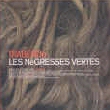|
|

Les Négresses Vertes Be careful, this album could become a mythic album in France (and elsewhere?). The group Les Négresses Vertes is one of the few remaining groups playing this kind of French rock, born in the middle of the 80's, like Mano Negra and Les Satellites. With this album they bring us a resurrection which we expected, but with little hope. Yet, the problems have been running for many years: with their label, and the death of the singer Helno in 1993. Perhaps because they sparingly distribute their music (4 studio albums in 12 years), we may assess it at its true worth, because we discover it gradually. There are maybe two reasons to cause this resurrection: a constant evolution in their music, and also the presence of Howie B on the production side. In fact, it is difficult to recognize the music of Les Négresses Vertes immediatly, after the first listening of Trabendo (the title is connected to the black market in Alger, to the currency dealing). From their first 7" in 1989 (Zobi La Mouche) to the last single released this autumn (Easy Girls, with the guitar and the chorus of the Irish musician Mundy), the electronic tones have become increasingly more important than the acoustic tones. The 2 first albums with Helno, Mlah (1989) and Famille Nombreuse (1991, with the famous hit Famille Heureuse to begin the album), have a light tone, very acoustic (piano, accordion, brass instruments), tinted of gaiety, recorded with 9 musicians and with French folk accent, Algerian raï, rock, ska, punk, and flamenco! Since Helno died in 1993, one studio album was released in 1994, as well as a live album (En Public Green-Bus, 1996), and especially a remixes album in 1993 (10 Remixes 87-93) with, among others artists, Massive Attack and Norman Cook. We already felt a change, with electronic tones, even if these followed from the remix spirit. The release of Trabendo has confirmed this change, with fewer musicians, because now there are 5 members. First the group worked with Doctor L, without keeping the songs (save for the text of the song Ce Pays). Then, they recorded with Howie B in the studio, as the producer. In fact, he is more than a production manager, he is also a co-composer, and certainly behind a few of these changes. Besides the new electronic tones, this album is darker than the last releases, even if the band say that "if the songs seem sad, this is because the most known songs ... have sometimes covered up the dark tendencies ... but the last-mentioned have always existed." But I feel that the Latin melodies of the other albums are less present now, replaced by somewhat longer tracks. Sometimes tinted with groove, sometimes resonant with a "big bass." Anyway, the flamenco strings, the accordian, and also the brass instruments are less obtrusive, but they have not disappeared. They are sometimes here to reveal some melancholy, some blues ... And even if the electronic sound is more important, the electronic instruments slip through the songs without taking up all the musical atmosphere, and the samples are "made by the band." A deep and touching album, which may be disconcerting for the "old fans," but finally, we listen to it with a certain pleasure, not only because of the music, but also because all the things the band has brought to the French musical stage for 12 years. We make an appointement with their next studio album in 3 years ... Copyright © 1999 Patrick Dubail
|
| © 2011 Luna Kafé |